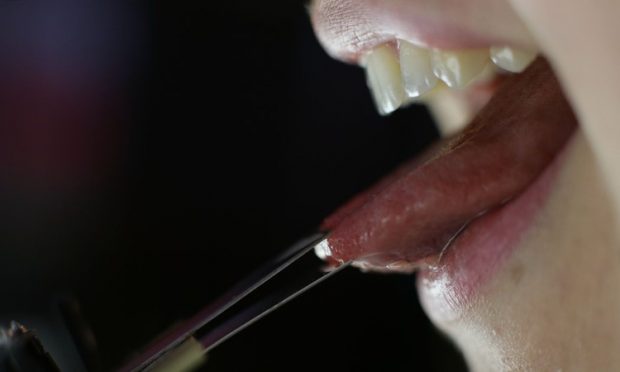
Tongue fat reduction may help overcome sleep apnea: Study
PTI, Jan 10, 2020, 2:13 PM IST

Washington: A potentially serious sleep disorder affecting breathing during slumber may be overcome by reduction of fat in the tongue, according to a study which may lead to new drug targets against the disease.
Nearly one billion adults around the world between the ages of 30 and 69 suffer from Obstructive Sleep Apnea (OSA), according to an earlier study published in the journal The Lancet Respiratory Medicine.
Currently, scientists – including those from the University of Pennsylvania in the US – used magnetic resonance imaging (MRI) to measure the effect of weight loss on the upper airway in obese patients.
Their recent study, published in the American Journal of Respiratory and Critical Care Medicine, said reducing tongue fat is a primary factor in lessening the severity of OSA.
“Most clinicians, and even experts in the sleep apnea world, have not typically focused on fat in the tongue for treating sleep apnea,” said Richard Schwab, study co-author from the University of Pennsylvania.
“Now that we know tongue fat is a risk factor and that sleep apnea improves when tongue fat is reduced, we have established a unique therapeutic target that we’ve never had before,” Schwab added.
According to the researchers, the condition – usually marked by loud snoring – can increase a person’s risk for high blood pressure and stroke.
While obesity is the main risk factor for developing sleep apnea, the scientists said there are other causes, such as having large tonsils or a recessed jaw.
In the current study, the researchers recruited 67 participants with mild to severe obstructive sleep apnea, who were also obese.
The participants lost nearly 10 per cent of their body weight, on average, over six months through diet or weight loss surgery, and correspondingly their sleep apnea scores improved by 31 per cent after the intervention.
The study participants underwent MRI scans to both their pharynx as well as their abdomens, both before and after the weight loss intervention.
Using statistical analysis, the researchers quantified changes between overall weight loss and reductions to the volumes of the upper airway structures to determine which structures led to the improvement in sleep apnea.
The findings revealed that a reduction in tongue fat volume was the primary link between weight loss and sleep apnea improvement.
According to scientists, tongue fat can be a potential therapeutic target for improving sleep apnea.
They suggested that future studies could be designed to explore whether certain low-fat diets are better than others in reducing tongue fat and whether cold therapies – like those used to reduce stomach fat – might be applied to reducing tongue fat.
However, the researchers said, these types of interventions have not yet been tested.
“Primary care doctors, and perhaps even dentists, should be asking about snoring and sleepiness in all patients, even those who have a normal body mass index, as, based on our data, they may also be at risk for sleep apnea,” Schwab said.
Udayavani is now on Telegram. Click here to join our channel and stay updated with the latest news.
Top News
Related Articles More

Include 4 hrs of physical activity, 8 hrs sleep in routine for optimal health, suggests study

Traffic noise can increase risk of cardiovascular disease: Study

Nearsightedness is at epidemic levels – and the problem begins in childhood

Study finds genetic basis for link between depression, heart disease

World Malaria Day: WHO calls for equitable health access
MUST WATCH
Latest Additions

ISRO releases ISSAR 2023 report on vulnerability of space assets to collisions

Hunasagi: MLA Bairati Basavaraj’s car overturned

No CM can remain absent for long, it’s against national interest: Delhi HC on Kejriwal

Cricket for the Blind: A Transformative Journey Empowering Visually Impaired Athletes

China lifts restrictions, gives all clear nod for Tesla cars as Musk lobbies hard in surprise visit to Beijing

























